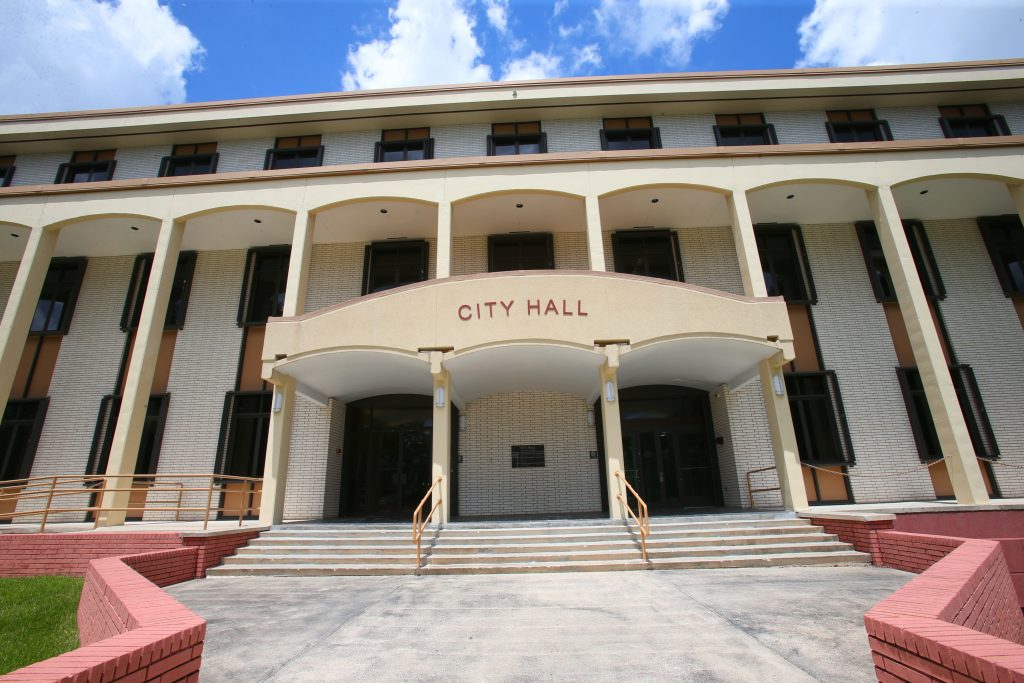Voters will decide on two charter changes

File photo: Ocala City Hill is shown in Ocala on Friday, June 19, 2020. [Bruce Ackerman/Ocala Gazette] 2020.

Ocala City Hill is shown in this June file photo. [Bruce Ackerman/Ocala Gazette]
More than 100 people filed into city hall on April 20 to either watch the discussion or take part in the debate over the proposals, which are set to appear on the ballot during city elections on Sept. 21.
While many showed up to speak against a proposal to eliminate gender-specific pronouns from the charter, other proposed amendments also struck nerves.
One sought to limit the mayor’s veto timeline from 10 days to 48 hours when considering a veto of an emergency ordinance.
The proposed change was in response to Mayor Kent Guinn waiting six days to veto the city’s emergency mask mandate, which the council passed on Aug. 4. The council later overturned the veto by a four-fifths vote on Aug. 12.
“This came to light during what I’ll refer to as the mask ordinance and the mayor’s veto of the mask ordinance,” city attorney Rob Batsel said. “I was asked to look into whether the mayor has veto authority. In my opinion, he does. Though there are good arguments on both sides, and there’s some ambiguity in our charter.
“We currently have a professional disagreement among the mayor and council about whether the mayor, in fact, has the ability to veto emergency ordinances.”
Council president Justin Grabelle and Councilman Matt Wardell believe the mayor lacks veto power over emergency ordinances.
“I actually strongly object to this ordinance. So, I’m not going to be supporting it tonight,” Grabelle said. “I don’t believe the mayor has any veto authority over an emergency order. I believe, in an emergency situation, when it required a four-vote majority anyway to pass an emergency ordinance that it is truly an emergency and that we need to act swiftly in that manner.”
Wardell agreed, hinting he would also vote against the proposal.
Guinn said the charter holds that the mayor can veto “any and all ordinances,” including, in his opinion, emergency ordinances.
Ted Schatt, a local attorney, said instead of the proposed changes to the timeline, put the larger question of whether the mayor should have the authority to veto an emergency ordinance to a vote.
“Why wouldn’t you just amend the proposed ordinance to say he has no authority and put that in front of the voters?” Schatt asked. “Put something in front of the voters. Let’s resolve this.”
But eventually, the proposal was withdrawn.
Batsel said the council has time to change the proposal before the election. It was not clear if the council would revise the proposed amendment.
Also withdrawn was the gender pronoun amendment, which proposed the removal of all masculine pronouns from the charter. Residents at the meeting overwhelmingly worried it was a backdoor attempt to move toward the use of non-gender pronouns.
The council also voted down an amendment to lift salary caps for elected officials and one setting term limits for elected officials.
The two remaining proposed amendments will go before the voters and include changes to the timeline of run-off and special elections and when the terms of elected officials begin and end.
The charter currently calls for run-off and special elections to happen during a 30 to 60-day window. The amendment would change that time to “as soon as reasonably practical.”
According to Batsel, the current timeframe would not allow enough time for certain overseas ballots to arrive and be counted.
Voters also will be able to clarify the start and end date of terms for the mayor and council members.
In the current charter, terms begin the first Tuesday in December after the election. The proposed change gives more specifics to prevent an overlap.
“What we’ve now done is amended the charter to provide that terms begin upon being adjudged and getting qualified by the city council, per the charter,” Batsel said. “Deeming someone qualified, certifying the election, they’ll swear-in oath and at that precise time is when the term will begin. And it will now end on that same process of a successor.”
The council voted unanimously to send both amendments to a referendum.





